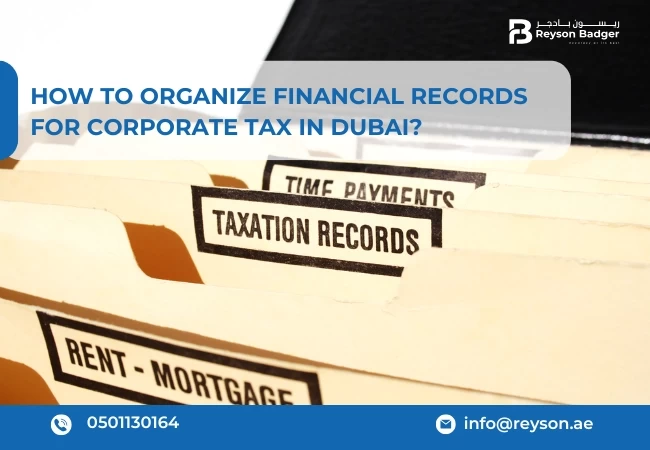How to Organize Financial Records For Corporate Tax in Dubai?
Written By Akshaya Ashok, Reviewed By Reyees K P
Published on 03/05/2025

Filing corporate tax in Dubai can feel daunting, but it doesn't have to be a stressful scramble. The secret to a smooth and efficient process lies in one crucial element: organized financial records. Think of it as building a solid foundation – without it, the entire tax filing structure can crumble under pressure, leading to wasted time, costly errors, and potential non-compliance with the Federal Tax Authority (FTA) regulations.
So, what's the game plan? That's precisely what this blog post is about! We're going to walk through a practical, step-by-step guide to getting your financial ducks in a row so that corporate tax filing in Dubai feels less like a hurdle and more like a gentle stroll. Ready to dive in?
What Exactly Does the FTA Expect From Us Anyway?
Alright, before we get into the nitty-gritty of organizing, let's just touch on what the FTA expects from businesses like yours. They need you to keep accurate and complete financial records. These records are the evidence that backs up all the figures you'll be putting into your tax return.
Think of it like this:
- Records of Income: You need to keep track of all the sales you make, the fees you charge for your services, and any other income streams. Things like sales invoices and service fee agreements are key here.
- Records of Expenses: Every expense you incur to run your business needs to be documented. We're talking about purchase invoices, receipts for those office supplies, payroll details, and rent payments.
- Asset and Liability Records: You also need records of your assets (like equipment or property) and your liabilities (like loans or money you owe to suppliers).
We're not going to get bogged down in all the legal jargon here, but it's good to have a general idea. For the full, official scoop, check out the FTA's website – they're the ultimate authority on all things tax!
Ready to Tidy Up? Let's Set Up Your Organization System!
Step 1: Paper or Pixels? Choosing Your Record-Keeping Method
So, how are you going to manage everything? You've got a few options:
Going Digital: Think cloud-based accounting software, spreadsheets, or even dedicated document management systems.
- The Good Stuff: It's super efficient, you can access your records from anywhere, searching for stuff is a breeze, and some software can even automate tasks. Plus, less paper clutter – win-win!
- Things to Consider: You'll need reliable tech, and you'll want to make sure your data is secure. There might be a bit of a learning curve at the start, too.
Keeping it Physical: Storing everything as hard copies in filing cabinets.
- The Good Stuff: You've got something tangible.
- Things to Consider: It can take up a lot of space, finding things can be a mission, and there's a higher risk of losing or damaging documents.
Mixing it Up (Hybrid): Maybe you keep digital copies but also have physical backups.
- The Good Stuff: You get a bit of both worlds.
- Things to Consider: You'll need to manage both systems, which can sometimes get a bit complicated.
Our Two Cents? For corporate tax in Dubai, especially with the whole e-filing thing on the EmaraTax portal, going digital is usually the way to go. It just makes everything so much easier and more accessible.
Step 2: What Goes Where? Setting Up Clear Categories
Imagine your finances as a big closet. If you just throw everything in, it's chaos, right? A chart of accounts is useful in this situation. It's like creating specific sections in your closet for different types of clothes. This helps you categorize all your income and expenses in a consistent way.
Think of categories like:
Money In: Sales from what you sell, fees for your services, maybe some interest you've earned, or rent if you own property.
What it Costs to Sell: If you sell products, these would be things like the raw materials and the direct cost of making them.
Keeping the Lights On (Operating Expenses):
- Salaries and what you pay your team.
- The rent for your office or shop.
- Your electricity, water, and internet bills.
- Getting the word out there – marketing and advertising costs.
- The everyday stuff like office supplies and maybe legal or accounting fees.
- Getting around – transport costs.
Other Bits and Pieces: Maybe interest you're paying on a loan, or any gains or losses from selling off old equipment.
Pro Tip: When you're setting up these categories, have your tax obligations in mind! Think about the different kinds of deductions you might be able to claim. Organizing your records in a similar way from the start can save you a lot of headaches later.
Step 3: Where Does Everything Go? Implementing a Filing System
Now that you've got your categories, you need a system for actually storing the documents:
Going Digital?
- Think Folders! Create a logical structure on your cloud storage or within your accounting software. Maybe start with the year, then break it down by month, and then by the type of document (like "Sales Invoices - January 2025").
- Name it Right! Come up with a consistent way to name your electronic files. Something like YYYY-MM-DD_InvoiceNumber_SupplierName or YYYY-MM_ExpenseReport_EmployeeName makes it super easy to find things later.
- Use Those Tags! If your software has tagging or labeling features, use them! You can add keywords to your documents to make searching even more flexible.
Sticking with Paper?
- Label Everything! Use clearly labeled folders and dividers in your filing cabinets. Organize by month, quarter, or the type of document (e.g., "Q1 2025 - Sales Invoices," "May 2025 - Supplier Bills").
- Keep it in Order! Within each folder, try to keep your documents in chronological order.
Step 4: Keep Things Separate! Records for Different Stuff
To keep things crystal clear, it's a good idea to keep separate records for different parts of your business finances:
- Show Me the Money (Sales and Revenue): All those invoices you send out, records of cash sales, and anything else that shows money coming into your business.
- What You Paid For (Purchases and Expenses): Every bill you get from suppliers, receipts for business expenses, and all the evidence of money going out.
- The Big Stuff (Assets and Depreciation): Records of everything your business owns (like computers, machinery, or vehicles), the agreements you used to buy them, and how they're losing value over time (depreciation).
- What You Owe (Liabilities): Loan agreements, statements showing what you owe to your suppliers, and any other debts.
- The Bank Stuff (Bank and Cash): Your bank statements, records of deposits and withdrawals, and those important bank reconciliation reports (we'll get to those in a sec!).
Step 5: Get it When it's Hot! Collecting and Storing Documents
Do not wait until the last minute to assemble everything! Make it a habit to collect financial documents as soon as they come in:
- Be Prompt! As soon as you get an invoice or receipt, deal with it. Don't let them pile up!
- Going Digital? Scan it now! If you get a paper document, scan it right away or use a receipt capture app on your phone and store it in the right digital folder.
- Paper Person? Have a Spot! If you're using a physical system, have a designated place (like a tray or temporary folder) where you put documents as they come in before you file them properly.
Step 6: Check it Twice (and Maybe Every Month!) - Regular Reconciliation and Review
Don't just file things away and forget about them! Regular checks are super important:
- Bank Reconciliation is Your Friend! Compare your bank statements with your own records of cash inflows and outflows regularly (ideally monthly) to make sure everything matches up. This helps you spot any errors or missing transactions.
- Review your financial records once a month or quarterly. This helps you catch any mistakes early, identify missing documents, and get a good overview of your business's financial health.
How Does Organized Record-Keeping Benefit Corporate Tax Filing?
So, why go through all this effort of getting organized? Because it makes your corporate tax filing in Dubai so much smoother! Here's how:
- Easy Peasy Data Entry: When your records are well-organized and accurate, filling out those online forms on the EmaraTax portal becomes way faster and less prone to mistakes.
- Claiming Deductions is a Breeze: You'll be able to easily find and support any deductions and allowances you're eligible for, potentially saving you money!
- Audits? No Sweat! If the FTA ever needs to take a closer look (an audit), having well-maintained records means you can provide the necessary information quickly and confidently.
- Say Goodbye to Stress! When your financial house is in order, tax season becomes less of a frantic scramble and more of a manageable task, freeing up your time and reducing your stress levels.
Wrapping Up: Get Organized and Conquer Tax Season!
Getting your financial records organized for corporate tax filing in Dubai is one of the smartest things you can do for your business. It saves you time, reduces errors, ensures you're compliant with the FTA, and ultimately makes the whole tax process much less painful.
Your Next Step?
- Take a good look at how you're currently managing your financial records.
- Identify the steps in this guide that you can start implementing today.
- Consider making the switch to a digital system if you haven't already.
- Establish those obvious categories and a consistent filing procedure.
Feeling overwhelmed or need expert guidance to ensure seamless corporate tax filing in Dubai? Don't navigate the complexities alone! Contact Reyson Badger for Corporate Tax Return Filing Services today for tailored solutions and expert support.
Want to learn more? Check out our other blog posts on Dubai Corporate Tax for even more helpful tips and insights!

Written By
Akshaya Ashok
Akshaya Ashok is a content writer specializing in creating content focused on accounting and auditing. With over two years of experience, she has developed expertise in crafting professional content for the financial sector.

